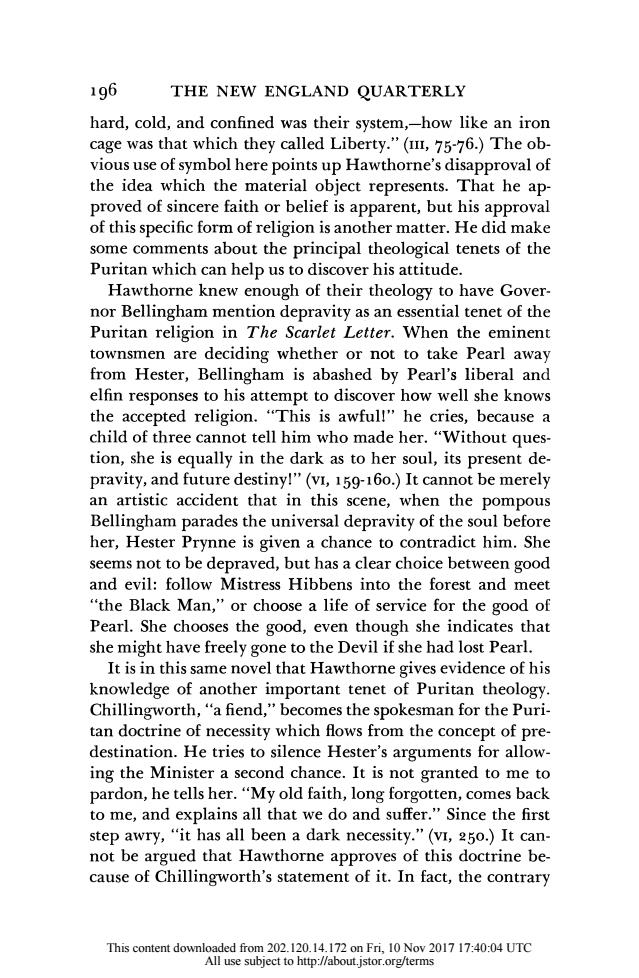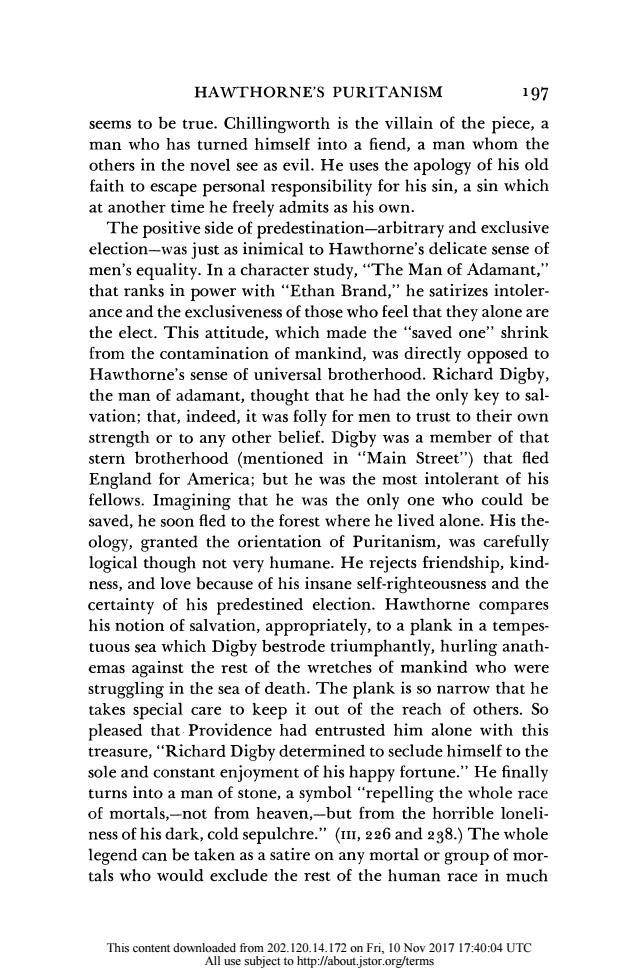
196 THE NEW ENGLAND QUARTERLY hard,cold,and confined was their system,-how like an iron cage was that which they called Liberty."(m,75-76.)The ob- vious use of symbol here points up Hawthorne's disapproval of the idea which the material object represents.That he ap- proved of sincere faith or belief is apparent,but his approval of this specific form of religion is another matter.He did make some comments about the principal theological tenets of the Puritan which can help us to discover his attitude. Hawthorne knew enough of their theology to have Gover- nor Bellingham mention depravity as an essential tenet of the Puritan religion in The Scarlet Letter.When the eminent townsmen are deciding whether or not to take Pearl away from Hester,Bellingham is abashed by Pearl's liberal and elfin responses to his attempt to discover how well she knows the accepted religion."This is awful!"he cries,because a child of three cannot tell him who made her."Without ques- tion,she is equally in the dark as to her soul,its present de- pravity,and future destiny!"(vI,159-160.)It cannot be merely an artistic accident that in this scene,when the pompous Bellingham parades the universal depravity of the soul before her,Hester Prynne is given a chance to contradict him.She seems not to be depraved,but has a clear choice between good and evil:follow Mistress Hibbens into the forest and meet "the Black Man,"or choose a life of service for the good of Pearl.She chooses the good,even though she indicates that she might have freely gone to the Devil if she had lost Pearl. It is in this same novel that Hawthorne gives evidence of his knowledge of another important tenet of Puritan theology. Chillingworth,"a fiend,"becomes the spokesman for the Puri- tan doctrine of necessity which flows from the concept of pre- destination.He tries to silence Hester's arguments for allow- ing the Minister a second chance.It is not granted to me to pardon,he tells her."My old faith,long forgotten,comes back to me,and explains all that we do and suffer."Since the first step awry,"it has all been a dark necessity."(vI,250.)It can- not be argued that Hawthorne approves of this doctrine be- cause of Chillingworth's statement of it.In fact,the contrary This content downloaded from 202.120.14.172 on Fri,10 Nov 2017 17:40:04 UTC All use subject to http://about.jstor.org/terms
196 THE NEW ENGLAND QUARTERLY hard, cold, and confined was their system,-how like an iron cage was that which they called Liberty." (iii, 75-76.) The ob- vious use of symbol here points up Hawthorne's disapproval of the idea which the material object represents. That he ap- proved of sincere faith or belief is apparent, but his approval of this specific form of religion is another matter. He did make some comments about the principal theological tenets of the Puritan which can help us to discover his attitude. Hawthorne knew enough of their theology to have Gover- nor Bellingham mention depravity as an essential tenet of the Puritan religion in The Scarlet Letter. When the eminent townsmen are deciding whether or not to take Pearl away from Hester, Bellingham is abashed by Pearl's liberal and elfin responses to his attempt to discover how well she knows the accepted religion. "This is awful!" he cries, because a child of three cannot tell him who made her. "Without ques- tion, she is equally in the dark as to her soul, its present de- pravity, and future destiny!" (vi, 159-160.) It cannot be merely an artistic accident that in this scene, when the pompous Bellingham parades the universal depravity of the soul before her, Hester Prynne is given a chance to contradict him. She seems not to be depraved, but has a clear choice between good and evil: follow Mistress Hibbens into the forest and meet "the Black Man," or choose a life of service for the good of Pearl. She chooses the good, even though she indicates that she might have freely gone to the Devil if she had lost Pearl. It is in this same novel that Hawthorne gives evidence of his knowledge of another important tenet of Puritan theology. Chillingworth, "a fiend," becomes the spokesman for the Puri- tan doctrine of necessity which flows from the concept of pre- destination. He tries to silence Hester's arguments for allow- ing the Minister a second chance. It is not granted to me to pardon, he tells her. "My old faith, long forgotten, comes back to me, and explains all that we do and suffer." Since the first step awry, "it has all been a dark necessity." (vi, 250.) It can- not be argued that Hawthorne approves of this doctrine be- cause of Chillingworth's statement of it. In fact, the contrary This content downloaded from 202.120.14.172 on Fri, 10 Nov 2017 17:40:04 UTC All use subject to http://about.jstor.org/terms

HAWTHORNE'S PURITANISM 197 seems to be true.Chillingworth is the villain of the piece,a man who has turned himself into a fiend,a man whom the others in the novel see as evil.He uses the apology of his old faith to escape personal responsibility for his sin,a sin which at another time he freely admits as his own. The positive side of predestination-arbitrary and exclusive election-was just as inimical to Hawthorne's delicate sense of men's equality.In a character study,"The Man of Adamant," that ranks in power with "Ethan Brand,"he satirizes intoler- ance and the exclusiveness of those who feel that they alone are the elect.This attitude,which made the "saved one"shrink from the contamination of mankind,was directly opposed to Hawthorne's sense of universal brotherhood.Richard Digby, the man of adamant,thought that he had the only key to sal- vation;that,indeed,it was folly for men to trust to their own strength or to any other belief.Digby was a member of that stern brotherhood (mentioned in "Main Street")that fled England for America;but he was the most intolerant of his fellows.Imagining that he was the only one who could be saved,he soon fled to the forest where he lived alone.His the- ology,granted the orientation of Puritanism,was carefully logical though not very humane.He rejects friendship,kind- ness,and love because of his insane self-righteousness and the certainty of his predestined election.Hawthorne compares his notion of salvation,appropriately,to a plank in a tempes- tuous sea which Digby bestrode triumphantly,hurling anath- emas against the rest of the wretches of mankind who were struggling in the sea of death.The plank is so narrow that he takes special care to keep it out of the reach of others.So pleased that Providence had entrusted him alone with this treasure,"Richard Digby determined to seclude himself to the sole and constant enjoyment of his happy fortune."He finally turns into a man of stone,a symbol "repelling the whole race of mortals,-not from heaven,-but from the horrible loneli- ness of his dark,cold sepulchre."(In,226 and 238.)The whole legend can be taken as a satire on any mortal or group of mor- tals who would exclude the rest of the human race in much This content downloaded from 202.120.14.172 on Fri,10 Nov 2017 17:40:04 UTC All use subject to http://about.jstor.org/terms
HAWTHORNE'S PURITANISM 197 seems to be true. Chillingworth is the villain of the piece, a man who has turned himself into a fiend, a man whom the others in the novel see as evil. He uses the apology of his old faith to escape personal responsibility for his sin, a sin which at another time he freely admits as his own. The positive side of predestination-arbitrary and exclusive election-was just as inimical to Hawthorne's delicate sense of men's equality. In a character study, "The Man of Adamant," that ranks in power with "Ethan Brand," he satirizes intoler- ance and the exclusiveness of those who feel that they alone are the elect. This attitude, which made the "saved one" shrink from the contamination of mankind, was directly opposed to Hawthorne's sense of universal brotherhood. Richard Digby, the man of adamant, thought that he had the only key to sal- vation; that, indeed, it was folly for men to trust to their own strength or to any other belief. Digby was a member of that stern brotherhood (mentioned in "Main Street") that fled England for America; but he was the most intolerant of his fellows. Imagining that he was the only one who could be saved, he soon fled to the forest where he lived alone. His the- ology, granted the orientation of Puritanism, was carefully logical though not very humane. He rejects friendship, kind- ness, and love because of his insane self-righteousness and the certainty of his predestined election. Hawthorne compares his notion of salvation, appropriately, to a plank in a tempes- tuous sea which Digby bestrode triumphantly, hurling anath- emas against the rest of the wretches of mankind who were struggling in the sea of death. The plank is so narrow that he takes special care to keep it out of the reach of others. So pleased that Providence had entrusted him alone with this treasure, "Richard Digby determined to seclude himself to the sole and constant enjoyment of his happy fortune." He finally turns into a man of stone, a symbol "repelling the whole race of mortals,-not from heaven,-but from the horrible loneli- ness of his dark, cold sepulchre." (Iii, 226 and 238.) The whole legend can be taken as a satire on any mortal or group of mor- tals who would exclude the rest of the human race in much This content downloaded from 202.120.14.172 on Fri, 10 Nov 2017 17:40:04 UTC All use subject to http://about.jstor.org/terms